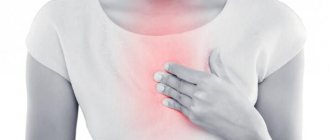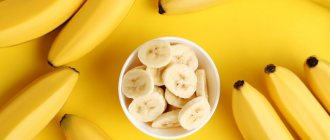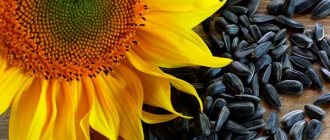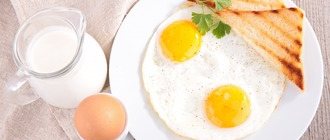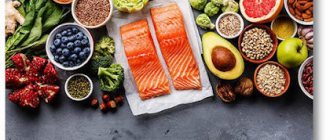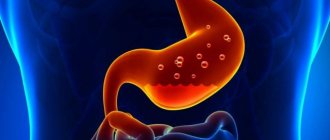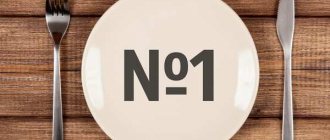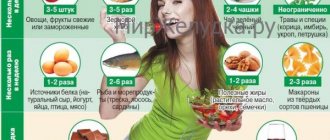Probably every person has encountered periodic heartburn at least once in their life. There is nothing wrong with this phenomenon if it is not permanent and does not cause severe discomfort. Not everyone knows what foods cause heartburn. In general, there are no “universal” products in this regard: someone suffers from a burning sensation in the chest after snacking on fried pies, while others have reported attacks after drinking a cup of strong coffee.
Everyone has their own list of foods that should not be eaten if you have heartburn. Before you go to the doctor, it’s worth remembering your own daily menu and determining what exactly prevents you from getting real pleasure from lunch and dinner. After this, it will become clear which foods are best to avoid, which ones to eat less often, and which ones you can eat without fear if you want to get rid of heartburn forever. In this article we will provide a list of foods that cause heartburn most often.
Why does heartburn occur?
The mechanism of the unpleasant phenomenon, when a burning sensation is observed in the upper part of the stomach and throat, has long been studied. The cause of burning in the epigastric region is the entry of acidic stomach contents into the esophagus.
Normally, the food bolus reaches the stomach, where it is exposed to hydrochloric acid. This is an aggressive liquid, but it is thanks to its properties that food begins to be digested and reaches a state where it passes unhindered into the intestines. The final digestion and absorption of nutrients occurs in the intestines.
What causes heartburn: causes and treatment
But when the lower esophageal sphincter weakens, part of the stomach contents is thrown back into the esophagus. The walls of this organ become irritated - burning, burning, and soreness occur. Heartburn is a symptom of acid reflux (reflux of stomach contents into the esophagus).
Weakening of the sphincter is possible due to a number of reasons, in particular:
- age (older people are more likely to suffer);
- diseases of the gastrointestinal tract;
- congenital features;
- excessive love for fatty and heavy foods.
To understand what causes heartburn and belching, you need to start keeping a food diary. Some foods have the ability to relax the sphincter, causing the person to suffer from repeated attacks.
Start writing down everything you eat and drink throughout the day, including small snacks, and note how you feel after eating each item.
How to get rid of heartburn with folk remedies
Components that increase gas formation
When patients ask what foods cause heartburn , gastroenterologists often provide them with a list of the following foods:
- kvass and other carbonated drinks. When they are consumed, the walls stretch, the pressure on the walls of this organ increases, as well as the concentration of digestive juices increases, which becomes a source of heartburn;
- legumes and peas - endowed with similar actions;
- dairy and fermented milk products with a high percentage of fat content;
- butter and margarine, especially in large quantities;
- milk, because with age, there are less and less enzymes for its processing;
- ice cream;
- baked goods and confectionery products;
- fresh bread.
Products that increase gas formation
Properties of foods that cause heartburn
The list of properties of foods that cause heartburn is not so extensive. The properties are as follows:
- ability to weaken the sphincter;
- “ability” to irritate the mucous membranes and stimulate the production of hydrochloric acid by the lining cells of the stomach;
- ability to slow down digestion.
If you want to understand what foods cause heartburn for you, you must first study the list of those that are considered potentially dangerous in this regard. It is not a fact that, for example, pork kebab, which your friend cannot eat because every time after such a picnic he suffers from stomach pain and drinks Almagel, will cause discomfort in you. It is possible that completely different products are contraindicated for your body.
And yet, let's first look at what general recommendations are given by doctors - gastroenterologists and nutritionists. Their advice is based on many years of patient observation.
Hard-to-digest foods
Many healthy foods are difficult for the stomach to digest, causing food to stagnate and become full, which can lead to reflux into the esophagus. Every person knows what foods cause heartburn, but most often it is provoked by:
- mushrooms - vegetable protein, heavy on the stomach;
- cereals: millet, pearl barley, corn – take a long time to digest and increase pressure in the stomach;
- seafood: shrimp, squid, oysters - people with frequent heartburn should consume them with great caution.
- exotic foods - foods that are unusual and can cause heartburn for various reasons. Avocado, for example, being a very healthy fruit, contains a lot of fat, for this reason the product “gets stuck” in the stomach for a long time, creating conditions for reflux.
Prohibited foods for heartburn
The list will definitely include the following, beloved by many, dishes:
- fatty meat and fish broths, soups, hot dishes;
- salted fish and in general everything that is salted from the heart;
- citrus fruits – fresh and their juices;
- spices;
- raw onion;
- coffee;
- alcoholic drinks;
- soda.
It is not necessary that the entire list is prohibited for you. Try eliminating each product in turn, and then it will become clear to you what you should give up.
Knowing what foods you shouldn’t eat if you have heartburn, you can create the perfect menu for yourself.
Why are fatty foods dangerous? They cause the sphincter to relax, and you won’t have to wait long for reflux.
Fatty foods include:
- red meat;
- many types of sea fish;
- cheese;
- cream;
- dough confectionery products prepared with a large amount of butter or margarine;
- nuts.
In addition to weakening the muscles that act as a barrier between the esophagus and the stomach, fatty foods promote the active release of the hormone cholecystokinin, which can also cause acid reflux. When the hormone is released excessively, food stays in the stomach longer. On the one hand, this is good, because it is better digested. On the other hand, the chances of reflux increase.
Milk deserves a separate discussion.
In many cases, it (in combination with soda) is used to relieve heartburn. But lately, you can increasingly hear about the opposite reaction: for many, milk just causes a burning sensation behind the sternum. This is probably due to the increased fat content of the product. Low-fat milk is not dangerous in this regard, but fatty milk, like cream, can provoke an attack. Increased individual sensitivity is also possible.
Foods that cause heartburn with gastritis
Gastritis occurs with high and low acidity. With low acidity, heartburn is rare, but increased acidity requires special attention.
In case of increased acidity of the stomach, during exacerbation of gastritis, the following are contraindicated:
- any seasonings;
- raw vegetables (not all fruits can be eaten either, for example, sour apples and citrus fruits are prohibited);
- fresh bread;
- alcohol.
All of them increase the production of gastric juice and are therefore unsafe.
Knowing which foods cause heartburn with high acidity, you can quickly cope with the disease and bring your stomach back to normal.
Some people find it easier to drink warm milk and soda from time to time. This method of helping yourself is not prohibited, but you should not abuse it, as you can achieve the opposite effect.
Products that increase the formation of hydrochloric acid with increased stomach acidity should be excluded. Otherwise, even the medications prescribed and taken according to the regimen will not give the desired effect.
What causes belching
Often reflux esophagitis is expressed by a burning sensation behind the sternum and belching.
Let's see which foods are best to avoid for heartburn and belching.
Below is a table that will help you remember what is best to exclude when belching, and what you can pamper yourself with.
Table 1. Dos and don’ts for heartburn with belching
| Foods that should not be eaten during belching and other dyspeptic symptoms | Authorized Products |
| Dishes flavored with pepper, mustard, ketchup | Puree soups with a minimum amount of salt, vegetable soups, chicken fillet |
| Pickled cucumbers and tomatoes | Stewed or baked vegetables |
| Marinated mushrooms | Mushroom soup |
| Chocolate, chocolate candies | Marmalade, marshmallow |
| Strong coffee | Tea |
After eating, it is extremely important not to lie down - instead, take a leisurely walk. You should not drink carbonated drinks with your meals.
Why does coffee cause heartburn?
Nutritional recommendations and diet
Rules of conduct for heartburn
If you follow the tips listed here, you will prevent troubles in the form of heartburn:
- It is recommended to eat more often, in small portions, then an increased amount of acid will not be produced. Eat 5 times a day and remember that the final meal is taken approximately 2 hours before bedtime.
- Also, the horizontal position provokes the backflow of contents into the esophagus from the stomach. Therefore, it is advisable to sleep with your head slightly elevated on the pillow.
- The menu for heartburn requires certain food processing, namely: stewing; steamed; boiled. It is advisable to forget smoked, salted, spicy, fatty, fried foods or eat them, but in small quantities.
- The temperature of the food is important. So, with gastritis and ulcers, any food should be warm; it is not recommended to eat cold or hot.
- Be sure to write a list of all the foods that cause heartburn in you, and try not to eat them.
- Watch your weight; you need to lose excess body weight. Exercise will help. Since excess weight weakens the lower valve of the esophagus.
- Chew crushed foods well; they are easier to process in the stomach. Smoking after meals causes problems with the production of certain substances in the stomach, and this leads to a new surge of heartburn.
Diet for heartburn
Fast food is a direct path to heartburn
There is a certain diet that will help prevent heartburn.
It is important to exclude all harmful foods from your diet, such as: fast food; salted peanuts; chips; fries.
Give preference to natural foods.
Here we need to consider in more detail which foods can cause heartburn:
- Whole dairy products. First they reduce heartburn, and then there is a secondary production of enzymes used for digestion in the stomach. You can’t completely eliminate milk from your diet, just try to drink it diluted or use it in other dishes. While on the diet, you should not eat ice cream.
- Alcohol. They are instantly absorbed into the walls of the stomach, leading to the production of hydrochloric acid. Experts recommend being more careful with wine and champagne.
- Strong tea and coffee, as well as mineral water with gas, and sour fruit drinks are prohibited. Caffeine relaxes the esophageal sphincter too much.
- Sugar is considered a favorable environment for the proliferation of harmful bacteria. Therefore, it should be completely excluded. Those who suffer from heartburn should not eat flour products, especially if they are fatty.
- Chocolate - everyone loves it, but when following a diet for heartburn, it is prohibited.
- Sour berries and citrus fruits, due to their high acid content, provoke heartburn.
- Fatty foods take quite a long time to digest, and when following a diet, you only need easily digestible food.
- Tomatoes and juice from them irritate the esophageal mucosa and lead to difficulties in the operation of the valve. Therefore, they and products based on them should be excluded from the menu.
- Saturated broths, whatever they are from, cause an increase in the production of gastric juice. Consequently, while on a diet, soups are prepared only with second, weak broths.
- A variety of spices, as well as fresh onions, are prohibited.
What foods are needed in a heartburn diet?
Food during the diet should reduce stomach acidity:
- Animal protein, but not fat, is allowed. This includes: chicken meat, but first you need to remove the skin and beef from it; eggs; low-fat cottage cheese; boiled or baked fish.
- Vegetables. These include: cucumbers; cauliflower; green pea; beets; carrot; potato; zucchini; pumpkin You need to be very careful with the last 2 vegetables, as well as beans, as they often cause bloating, which leads to heartburn. Pears and bananas. They can be baked or raw.
- Almost any porridge is allowed, but only it must be cooked in water.
- You can have yesterday's bread, preferably white, not black. Since the latter causes bloating.
- Soups with cereals and vegetables, seasoned with butter.
- Any natural oils that are added to prepared foods.
- Fresh vegetable juices drunk before meals will prevent heartburn.
If it does arise, a decoction of dill seeds will help “quench” it. It is done like this: take 2 teaspoons of dill seeds and pour a glass of hot water into it, then wait for about 10 minutes, and then drink.
There are other methods of alternative therapy that are excellent for helping with heartburn; there are many of them on the Internet and various book publications on herbal medicine and treatment with folk methods.
For people suffering from chronic heartburn, following a diet is necessary in the absence of its manifestations, since otherwise heartburn may return.
List of foods that can cause heartburn
Once you keep a food diary, you will be able to determine which foods to avoid.
Not only citrus fruits, spices, salt and fatty foods, but also seemingly harmless herbs like mint contribute to increased acidity and a burning sensation in the esophagus. Mint irritates the mucous membranes of the stomach and esophagus, and therefore should be discarded. Sometimes, of course, you can indulge in a cup of aromatic tea with a mint leaf, but you should not arrange such gatherings often.
Foods that provoke heartburn in pregnant women can be anything if the food is eaten in large quantities and before bedtime. During early pregnancy, hormonal changes occur in the body, and a burning sensation can arise suddenly from the safest foods. Under the influence of progesterone, the smooth muscles of internal organs relax, including the sphincter between the esophagus and stomach. This leads to the fact that the sphincter is constantly in a half-open state.
In the later stages, the uterus enlarges and puts pressure on the stomach, and therefore the likelihood of heartburn and belching increases.
With gastritis and reflux, if these were observed before pregnancy, the requirements for dieting increase.
During pregnancy, exclude everything fried and fatty, give up fast food: salted nuts, chips, crackers. Forget about pizza, no matter how tasty it may seem, and about semi-finished products.
Causes
There are two main causes of the symptom, which are often combined in the same patients. The first is weakness of the cardiac sphincter. This is a muscular “flap” between the stomach and esophagus, preventing the reflux of acid and food. If it loses the ability to fully perform its function, reflux begins to occur much more often than in a healthy person.
Another reason is the stomach's overproduction of hydrochloric acid. In this condition, it enters the final sections of the esophagus in significantly greater quantities compared to the norm. The result is greater tissue damage, even with relatively few reflux events.
These disorders, as a rule, do not develop independently. They are constant companions of certain diseases of the digestive tract. Therefore, if they occur, the following pathologies should be excluded:
| Disease | What it is? | Features of symptoms |
| GERD or gastroesophageal reflux disease | A chronic disease in which the sphincter (muscular barrier) between the esophagus and stomach cannot fully perform its function. Because of this, the patient experiences frequent refluxes that damage the tissue of the esophagus. | Typically, GERD is the main cause of heartburn after eating. Unpleasant sensations occur immediately or within 20-30 minutes. Often this symptom can be combined with the following pathological signs:
|
| Hyperacid gastritis associated with Helicobacter pylori | Inflammation of the inner (mucous) wall of the stomach due to exposure to a microorganism. Trying to kill the bacterium, the organ produces more acid, but this protective reaction only has a negative effect. Helicobacter is resistant to its action, unlike the tissues of the esophagus. | A burning sensation almost always accompanies gastritis and peptic ulcers, but, in most cases, fades into the background for patients. First of all, they are worried about pain in the abdomen (directly under the sternum). If the stomach is damaged, it occurs 15-30 minutes after eating. If the duodenum is injured - after 1.5-2 hours. |
| Peptic ulcer of the stomach and duodenum | This pathology is often a consequence of hyperacid gastritis, but differs from it in deeper damage to the organ - in addition to the mucous membrane, the underlying layers can also be damaged. | |
| Hiatal hernia (or hiatal hernia) | The pharynx and stomach are connected by the esophagus, which passes through the entire chest cavity before entering the stomach. If it begins to “bulge” into this cavity along with other digestive organs (most often this is the initial section of the stomach), a hiatus hernia develops. | In 30% of patients, this pathology occurs latently, but in other cases it manifests itself as burning pain behind the sternum. |
| NSAID gastropathy | Uncontrolled use of non-hormonal painkillers is increasingly leading to negative consequences. These medications not only relieve pain, but also destroy the stomach's natural defenses against its own acid. As a result, the walls of the organ are injured, and this serious disease develops. | A distinctive sign of NSAID gastropathy is a strong burning sensation and very intense pain while taking medications from this group. These include:
|
The causes and treatment of heartburn are closely related. Despite the fact that the general principles of treatment for these diseases are largely similar to each other, each of the pathologies has its own characteristics. These nuances are very important to consider, as they can have a significant impact on the outcome of the doctor’s actions.
Foods you can eat against heartburn
The following products will help get rid of the burning sensation in the esophagus and stomach:
- melons and watermelons;
- boiled rice (without spices);
- raw carrots;
- bananas.
All of these anti-heartburn products partially eliminate the discomfort and help alleviate the condition.
You can try apples (sweet, soft) - they are rich in pectin, which helps reduce the burning sensation. Bananas contain potassium, which has an alkalizing effect.
You can prepare dishes from lean fish and stewed vegetables. Ginger is allowed as a seasoning, which reduces the time food stays in the stomach, promotes its speedy digestion, which means the likelihood of heartburn is reduced.
What foods help quickly relieve heartburn?
It is possible to eliminate heartburn with the help of products, and this method is the simplest - you do not need to run to the pharmacy for expensive drugs, because many “rescuers” are almost always at hand. And such products that help out at the right time include not only baking soda.
Recipes for quickly eliminating heartburn:
- Finely grated carrots will help calm your stomach; to achieve the effect, you should eat them slowly.
- Oatmeal cooked in water can extinguish a fire in the esophagus.
- A banana eaten after a hearty breakfast rids your body of excess gastric juice, so it will also serve as an excellent remedy for heartburn.
- Potato juice is a recognized lifesaver for people suffering from heartburn. To be effective, you need to drink this juice in a course - a quarter glass 3 times a day before meals. It is better to drink potato juice on an empty stomach, and it is recommended to eat food only after an hour.
- Fresh crushed ginger - consume only 4 g per day.
- Boiled peas - chew them thoroughly and only then swallow.
- Drink warm and most importantly low-fat milk in small sips. You can also try kefir instead of milk as a remedy for heartburn - nutritionists and doctors say that fermented milk products are more effective in fighting heartburn.
- Still water will help quickly relieve an attack of heartburn.
- Heartburn suddenly started? Eat any boiled porridge. The exception is instant porridge - they are harmful even for a healthy person.
- Steamed veal cutlets and other lean meats, boiled chicken fillet, and rabbit meat are good remedies for heartburn: the stomach spends a large amount of acid on digesting protein, which means it will be directed in the right direction and will not bother you after the meal.
- Puree soups envelop the stomach lining and have a gentle effect on it, helping to get rid of the feeling of fire inside.
- Seeds and various nuts also help quickly eliminate heartburn. The main thing is that it is a natural product without additives - various store-bought snacks with flavors will not work.
- If you have heartburn, chew barley grains or oats - the saliva released will help reduce the burning sensation.
- Boiled egg shells ground in a coffee grinder easily neutralize the effect of hydrochloric acid due to the high calcium content, which, in turn, blocks the burning sensation. To relieve an attack, take half a teaspoon of powder and drink a glass of water.
- A teaspoon of olive or sunflower oil also relieves heartburn by coating the stomach lining.
As you can see, there are many helpers in the fight against heartburn, and all of them are often found in our kitchen.
Lifestyle recommendations to help reduce discomfort
To get rid of the unpleasant feeling in the epigastrium, you need not only to adjust your diet (exclude foods that cause heartburn), include in the menu dishes made from products that act against heartburn, but also follow the recommendations of nutritionists:
- eat food in small portions, but often;
- grind food well or chew food thoroughly (mechanical sparing of the stomach reduces the secretion of hydrochloric acid);
- dishes should be warm (hot and cold - irritate the gastric mucosa, as a result, secretion is stimulated)
- do not go to bed on a full stomach;
- sleep on your left side;
- lead an active lifestyle, move more;
- forget about the habit of smoking.
Sleeping on your side (left) eliminates pressure on the pancreas and reduces the likelihood of gastric juice refluxing in the wrong direction.
Small meals allow food to be digested faster. It is necessary to maintain water balance, that is, drink at least 1.5 liters of water per day. More quantities are allowed if desired. This helps to establish metabolism and normalize the process of food processing.
What foods can you eat?
If you have heartburn, you can eat without fear:
- stews;
- steamed dishes;
- fresh carrots;
- dairy products.
All these are dishes that do not cause digestive disorders and do not overload the gastrointestinal tract.
Other products
Nutritionists recommend that anyone who is prone to heartburn pay special attention to their diet. What was indicated above is what causes heartburn , but there is a list of components that in reasonable quantities will not cause such a symptom. These include:
- freshly squeezed juices diluted with purified or boiled water, but without pulp;
- peaches and grapes;
- raspberries and blueberries;
- strawberries;
- chicken and other dietary varieties of meat, poultry and fish.
conclusions
If you are from time to time tormented by a burning sensation in the chest, it is important not only to know what foods you should not eat if you have heartburn, but also to follow a diet, that is, snack 5-6 times a day in small portions.
Severe heartburn is most often provoked by heavy lunches or dinners, so moderation should be observed during any feast.
Any dish should be eaten no later than an hour and a half before bedtime. After eating, you need to take a short walk and stretch.
It's difficult to control yourself while sleeping, but try not to fall asleep on your right side or back so you don't wake up at night from a heartburn attack.
Heartburn is not life-threatening, but it is the most common sign of trouble in the digestive system. If it does not recur often, it makes sense to analyze your diet in order to eliminate foods that provoke it. But if the burning sensation in the chest is constantly repeated, accompanied by pain, heaviness, and nausea, it is worth being examined by a gastroenterologist to identify diseases of the gastrointestinal tract. Treatment may be needed, as heartburn can be a symptom of gastritis, stomach ulcers and other ailments.
Foods that irritate the esophagus
With frequent heartburn, constant foci of irritation appear on the mucous membrane of the esophagus. Symptoms of heartburn no longer arise after the contents of the stomach are refluxed, but when acidic foods directly enter it. They will have to be excluded from the diet until complete recovery.
- Alcohol plays an active role in the development of heartburn: it reduces the tone of the cardiac sphincter and stimulates the production of hydrochloric acid. But its main effect is irritation of already damaged areas of the esophagus. The most common triggers of heartburn are sour red wines.
- Pickles and marinades act on sore spots of the esophagus in the most merciless way: salt and vinegar are delivered to the inflamed areas, causing severe irritation in the form of a burning sensation, which is not relieved by antacids.
- Citrus fruits and juices from them can cause a strong burning sensation in the chest - this is how organic acids act on inflamed areas. If you have a diseased esophagus, it is not recommended to eat fresh apples, grapes, currants, and cranberries. You can eat bananas, pears, sweet berries.
- Not all raw vegetables are safe for a diseased esophagus: tomatoes and zucchini can cause unpleasant symptoms, and sometimes cucumber juice has a traumatic effect.
Nutrition can be medicine or it can be poison. Knowing the mechanisms of heartburn formation when eating, you can control these symptoms and prevent their frequent occurrence.
We recommend: How to quickly and safely get rid of heartburn during pregnancy in the third trimester?
